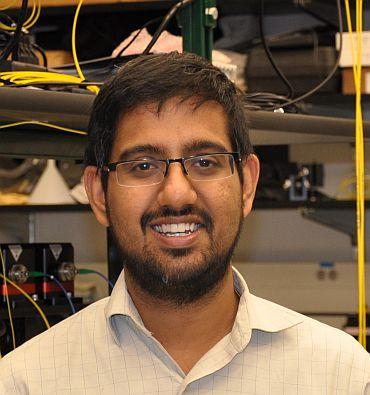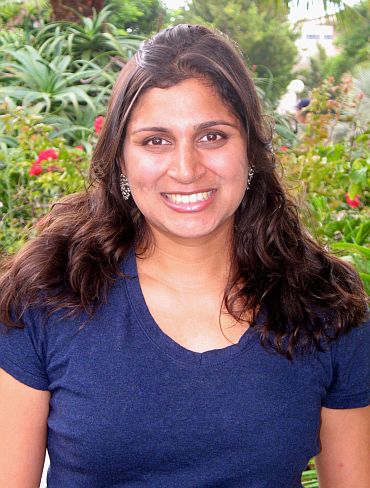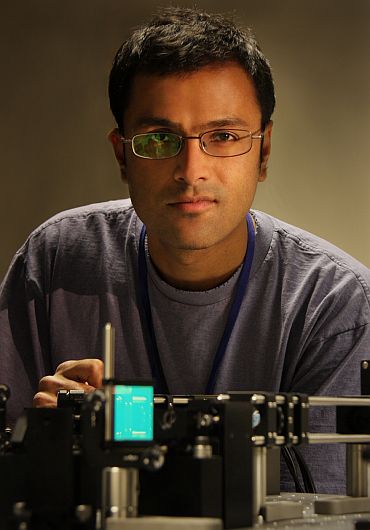Aziz Haniffa in Washington, DC
Three Indian Americans -- Dr Kartik A Srinivasan, Sumita Pennathur and Hari Shroff -- were among 94 researchers who were named by United States President Barack Obama as recipients of the Presidential Early Career Awards for Scientists and Engineers, the highest honour bestowed by the US government on science and engineering professionals in the early stages of their independent research careers.
The White House said that the presidential early career awards embody the high priority the Obama administration places on producing outstanding scientists and engineers to advance the nation's goals, tackle grand challenges, and contribute to the American economy.
Sixteen Federal departments and agencies join together annually to nominate the most meritorious scientists and engineers whose early accomplishments show the greatest promise for assuring America's preeminence in science and engineering and contributing to the awarding agencies' missions.
Srinivasan, 31, is the project leader of the research group on nanofabrication at the Center for Nanoscale Science and Technology, which is part of the National Institutes of Standards and Technology, which comes under the purview of the Department of Commerce.
Pennathur, 33, is assistant professor of mechanical engineering at the University of California in Santa Barbara and her research project was nominated through the Pentagon, and Shroff, 29, heads up the lab at the National Institute of Biomedical Imaging and Bioengineering, which is an appendage of the National Institutes of Health, which is under the aegis of the Department of Health and Human Services.
Please ...
'It is inspiring to see the innovative work being done by these scientists'
Image: Sumita PennathurObama said, "It is inspiring to see the innovative work being done by these scientists and engineers as they ramp up their careers -- careers that I know will be not only personally rewarding but also invaluable to the nation."
"That so many of them are also devoting time to mentoring and other forms of community service speaks volumes about their potential for leadership, not only as scientists but as model citizens," he said.
The awards, established by President Clinton in 1996, are coordinated by the Office of Science and Technology Policy within the Executive Office of the President.
Awardees are selected for their pursuit of innovative research at the frontiers of science and technology and their commitment to community service as demonstrated through scientific leadership, public education, or community outreach.
The elation of Srinivasan, Pennathur and Shroff at being named for these prestigious awards was palpable, but they were quick to point out to rediff.com that theh were being so honoured thanks to their associates and colleagues who were all part of a team that made them all winners and they were simply the representatives of a winning team.
The El Paso, Texas-born Srinivasan said, "I am very excited about this award and appreciate the recognition that it brings to younger scientists at the start of their independent research careers."
The Foxboro, Massachusetts-born and raised Pennathur said, "I am honoured to be awarded this award to further my research in the development of a nanofluidic tool for protein transport and kinetic measurements."
"I would like to sincerely thank the combined support of the US Army Research Office, and UCSB's Institute of Collaborative Biotechnologies, Department of Mechanical Engineering, and California NanoSystems Institute to make this dream possible," she said.
Kerala-born Shroff, who moved with his parents, both physicians to England at age one and then to the US at age nine, said. "I'm honoured and pleasantly surprised to receive this award and am grateful for the visibility it gives to my lab."
"I'm indebted to the hardworking post-docs and students in my somewhat young laboratory at the NIH, the guys who hired me and their support helps to make the NIH is a really great place to work," he said, and added: "I also am fortunate to have worked with some stellar scientists and mentors that have provided me top-notch training as a graduate student and as a post-doc."
'In the end, luck plays a large role'
Image: Hari ShroffShroff noted that, "It's worth remembering that for every scientist chosen to get this award, there are dozens of others that are equally -- or more -- deserving. I don't really understand how one compares scientists at this level and decides who gets an award like this -- my feeling is that in the end luck plays a large role."
Thus, he argued that "on some level, the honours and awards are thus unreal -- the kick in the discovery, the pleasure of finding the thing out, the idea that your work is found valuable and is used by other scientists -- these are the real rewards."
Srinivasan received his BS, MS and PhD degrees in Applied Physics from the California Institute of Technology, where his graduate research was supported by a Fannie and John Hertz Foundation fellowship.
After receiving his BS, he worked for one year at XPonent Photonics, a startup company based in Monrovia, CA. After completing his PhD, he continued at Caltech as a postdoctoral fellow at the Center for the Physics of Information. In September 2007 he joined the CNST, where he is leading projects in the field of nanophotonics.
Srinivasan has published over 40 peer-reviewed papers in journals such as Applied Physics Letters, Physical Review, Nature, Nature Photonics, and Science, on topics including microcavity lasers, chip-based cavity quantum electrodynamics, near-field optical probing, semiconductor quantum dots, and the electromagnetic design and nanofabrication of photonic crystal devices.
His parents, Vilappakkam Srinivasan and Kalpagam Srinivasan both hail from Chennai and immigrated to the US in 1971.
Both are retired now and living near Glendale, CA. His mother was a tax preparer and also worked in real estate, while his father was professor of mathematics at the University of Texas at El- Paso and is now professor emeritus. He moved to El Paso after working as faculty in the mathematics department at Punjab University in Chandigarh.
Srinivasan's wife, Hanna Kim, is a pediatrician at the Children's National Medical Center in Washington, DC.
Pennathur, whose research is focused on using fundamental fluidics knowledge at both microscale and nanoscale to create novel devices for practical applications, received both her BS and MS degrees in aerospace and aeronautical engineering from the Massachusetts Institute of Technology, where she studied microscale cavitation in microelectromechanical systems.
She received her PhD in mechanical engineering from Stanford University in 2006, where she investigated electrokinetic transport of fluids at the nanoscale.
Her work at UCSB has included major efforts at creating and developing enabling tools to identify and characterise biological substances, improving current bioanalytical devices, and designing entire systems for point-of-care usage.
Her father, Pennathur 'Bob' Ganapathy is and industrial engineer and her mother, Chandra Ganapathy, is a dietician/nutriontist. Her parents also hail from Chennai. She's got one sibling, a brother, Satish Pennathur, who is a musician based in New York City.
Shroff, whose parents after moving to Cleveland, Ohio, then moved to Seattle, Washington, attended college at the University of Washington's Early Entrance Program, and then graduated in 2001.
His father Ashok Shroff was born in Mumbai but raised in Delhi and his mother, Mary Shroff, hails from South India with a BSE in Bioengineering and then moved to Berkeley, California where he obtained PhD in biophysics.
In 2006, he moved to Ashburn, Virginia to do his post-doc at the Howard Hughes Medical Institute's Janelia Farm Research Campus.
Shroff then moved to the NIH to start his own lab in the fall of 2009.
He has one sibling, a younger brother, Ravi, who just received his PhD from the University of California, San Diego, and has just started his post-doctoral studies in Australia.




article